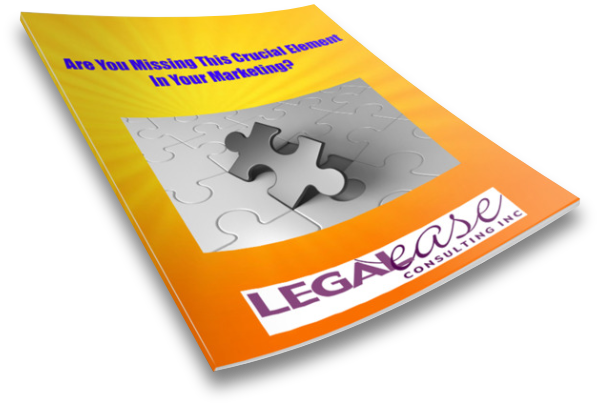The April 14, 2006 ABA Journal e-report contained an interesting article that is another reminder to make sure your fee agreement says what you think it says. The article was about a lawyer in Louisiana who took a will contest case on a contingency fee, but after negotiating a good settlement for his client, ended up with nothing when his client refused to settle.
According to the article, the fee agreement indicated that the lawyer would be entitled to one third of ‘whatever additional property or money we can get for you.’ Although the lawyer was able to negotiate a settlement wherein his client would have received over $20,000 more than what he would have been entitled to under the will, the client refused to settle, fired the lawyer, and attempted to pursue recovery on his own, but lost the case.
Although the trial court and one appellate court agreed with the attorney that he was entitled to one third of the settlement amount, the Louisiana Court of Appeals reversed, noting that since the client obtained no additional recovery, the lawyer was not entitled to a contingent fee.
The Louisiana lawyer submitted a brief which, at least according to the article, seems to express outrage that the client didn’t seem to care about the money, but was more interested in forcing a trial and appeal on his adversaries. The lawyer’s brief indicates surprise that he would be expected to spend several days in court (a 180 mile round trip distance) just to lose the case, and wouldn’t even be able to recover his expenses. But it was the lawyer’s fee agreement that dictated the result.
This result is, in my experience, not all that uncommon in contingent fee arrangements. The client is always the one with the power to make the ultimate decision whether to settle or to move forward. Often, the client’s decision to move forward with a trial rather than accepting a settlement offer results in no recovery for the client, and no recovery for the lawyer.
What many lawyers seem to forget when taking on clients is that although the lawyer may see the case in terms of monetary value, the client doesn’t necessarily see it that way. Litigation, particularly litigation pitting family members against one another (such as divorce, or will contests like the one here) often has at its root more emotion than reason. Lawyers often express frustration that the client doesn’t want to accept what the lawyer considers to be a ‘good’ settlement or complain that their clients aren’t ‘making sense’ . But many times, the problem is with the lawyer, not the client. What makes sense emotionally to the client might not make sense financially. It’s the lawyer’s job to discuss these issues with the client not only during the representation, but before any fee agreement is signed.
It is the lawyer’s responsibility to explore with any potential client what the client seeks to accomplish by hiring the lawyer. Then, and only then, can the lawyer decide whether the case is one the lawyer can or should take on, and if so, how the lawyer’s fee should be structured. If the lawyer decides to take on the client, expectations must be specifically discussed and memorialized so that both the lawyer and the client are sure that they are working toward a common goal. The lawyer’s fee agreement should reflect that, and should be a ‘good deal’ for both the client and the lawyer.
The contingent fee agreement is one which is inherently risky for both lawyer and client. But often lawyers forget that they are shouldering some of the risk, and get angry or frustrated when their gamble loses. If the lawyer isn’t willing to take the risk then the contingent fee agreement isn’t the way to go.
Perhaps the attorney in this story didn’t have had a frank discussion with his client before any fee agreement was signed to determine what his client’s stated objectives were. That conversation may have revealed that the client expected a certain specific monetary recovery that the lawyer didn’t think was possible. If that was the case, and the client indicated an unwillingness to settle for anything less than the stated amount, the lawyer would have at least been better informed about the risks he would be taking by agreeing to represent the client at all, particularly under a pure contingency arrangement.
If the lawyer had learned that the client’s motivation was not the monetary recovery at all, but that the client wanted to force the family through a trial (as the lawyer later claimed), the lawyer could have agreed to take the case under a different fee arrangement. But even without being sure of the client’s motivation, the lawyer’s fee agreement could have minimized some of the risk to the lawyer.
What alternatives were available? There are probably an unlimited number of possibilities. The lawyer could have written the fee agreement to require the client to pay expenses regardless of the outcome. He could have requested an additional fee for trial. He could have requested a flat fee up to trial with a bonus for settlement above a certain amount. He could have asked the client what the value of having the emotional ‘closure’ of a trial was to the client, and based his fee on that, rather than on a percentage of the recovery.
Just because the most traditional and most common methods of compensation for lawyers have been the one third contingency and the hourly rate doesn’t mean that lawyers should conform to those old practices, which may be some of the worst ways (for both lawyers and clients) to compensate lawyers for the work that they do. Lawyers draft their own fee agreements. It’s time to get more creative and do some serious thinking about how lawyers benefit their clients, and how to structure fee agreements to reflect those benefits.
If you liked these articles, subscribe to my e-newsletter, and you’ll receive new articles in your in-box. The articles in the newsletter are not available to the public – the only way to see those articles is to receive the newsletter.
Already a subscriber? Want to learn how I can help you? Learn more about the products and services I offer by clicking here.

Allison C. Shields
Legal Ease Consulting, Inc
Creating Productive, Profitable and Enjoyable Law Practices

P.S. Found a mistake or a bug? If there’s anything that bothers you about this site, I want to know! Send me an email at Allison@LegalEaseConsulting.com. I want this site to be not just a resource, but a refuge for lawyers. I want you to be comfortable here. So if there’s something that bothers you, please tell me!



